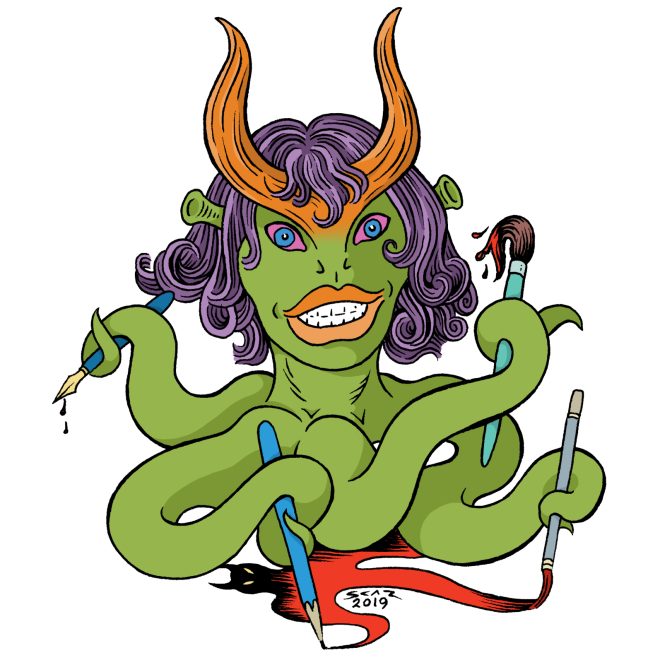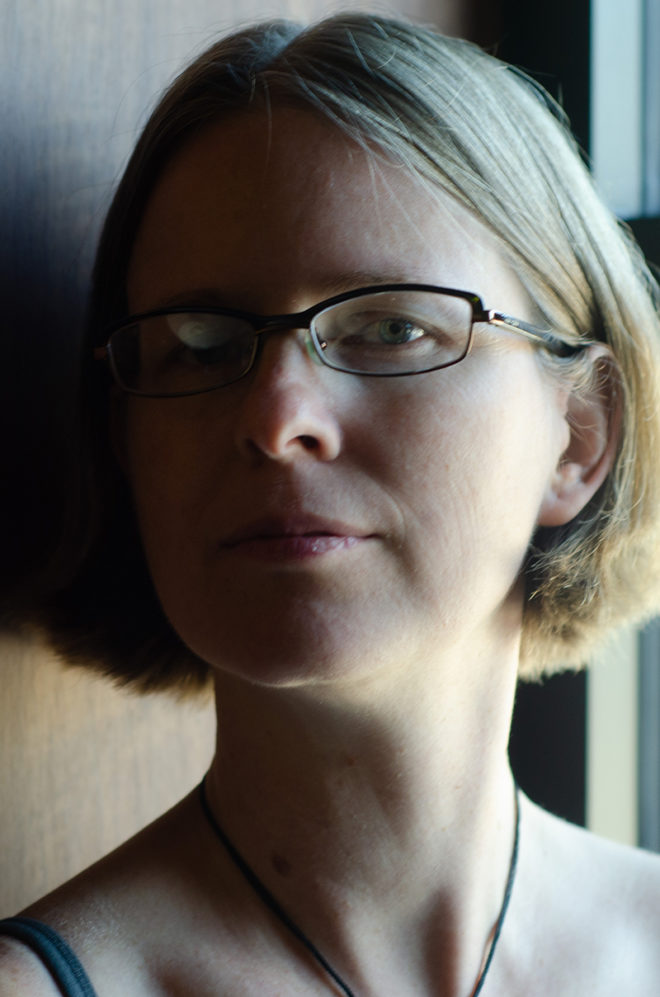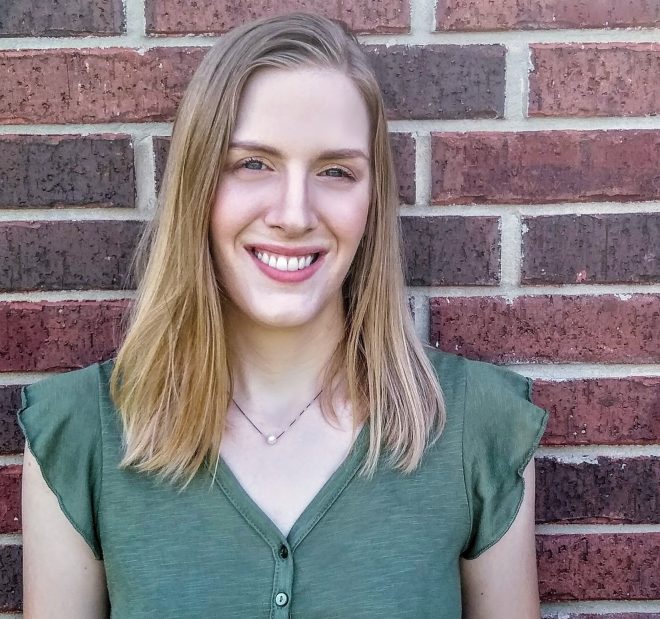PseudoPod 874: Flash on the Borderlands LXVII: Ichthyic
Show Notes
Snotty: I watched a documentary that featured snot otters and began thinking again about how some amphibians are able to regenerate limbs. The next morning I woke up with this story and all its elements and themes fully formed in my head, and immediately wrote it down. It was one of the few times that I didn’t have to wrestle a story into shape.
Ewan McGregor in Desserts Short Film 1999
Fishing is a discipline in the equality of men – for all men are equal before fish.
Bitter Is The Sea, And Bright
by Michelle Muenzler
When the Isperfell come to our village of Merse by the Sea, it is not with their delicate bone-lattice knives readied and their faces painted for war. No, they approach the old way. Slowly and from just down the shore, emerald sea water cascading from their bright scales and lean arms opened wide.
Their needled teeth gleam.
“We stay,” they say, though it takes us some moments to make out the words, the long jaws of the Isperfell not being made for human speech.
But once the words are known, we do what any other village clinging to survival along these remote shores would do in our place. We greet our new guests as in the old stories–a pained smile on every face–and welcome them to our homes to stay.
It’s the price of the sea, after all. One that every village knows it will someday pay.
They were seven days the last time they stayed, or so say our elders with their shaking voices and trembling hands clutched against their chests. Seven days and seven nights, and half a morning spent watching them go.
And that time, the host village was lucky. That time, the Isperfell left on their own.
We at Merse by the Sea are not so blessed.
Which is why when the tenth day approaches, shells are pulled from a dusty bag long set aside for just this purpose, and Leena who just finished suckling her first child and is thick with another draws the lone striped one. Several question the wisdom of the bag’s choosing, but in the end, it is agreed that not even the Isperfell–incomprehensible though they may be–would be so cruel as to separate mother from child.
Trembling, Leena approaches a smaller Isperfell with scales like blue glass and asks if they are ready yet to go.
Gentle, like Leena to her own child, the Isperfell pulls her into its loose embrace. One webbed claw rests atop her broad belly, and its long snout nuzzles against her cheek. The pulse along Leena’s neck throbs. Then, whisper-fast, the Isperfell slides its bone-lattice knife across her throat.
“We stay,” says the Isperfell, cupping Leena to its concave chest. Her fish-gasps spill blood in bright ribbons to the floor until there is no more to spill, and only then is she discarded from the Isperfell’s embrace.
We linger awake through the night, stomachs heaving.
But come morning, we force the smiles back onto our faces. Wait for the Isperfell to indicate they are done with us at last, that Leena’s sacrifice was of worth.
The Isperfell, however, remain.
Smiling with their sly fish-pin teeth and watching us even as we watch them in return.
At twenty days, our stores of smoked fish and preserves are gone. Yet still we do our best to weather the unfathomable storm that is the Isperfell. This remote village is our home, after all. This sea, our blood.
Hungered, our children take to trapping the small rats that creep through the stores at night, an act the Isperfell ignore. Less acceptable is the young couple that decides to toss their nets into the shallows despite all warnings from the elders. To that the Isperfell take great offense.
The Isperfell do not bother with their knives for the couple.
Their teeth are sharp enough.
And so we stick to trapping rats. To ravaging our gardens before their season. To slaughtering what few milk goats can be spared. And also praying to whatever gods will listen that the Isperfell do not take further offense.
That they do not decide to go to war.
Of course, we also debate the choosing bag with its many shells.
Some say it is time for another choosing. Only then will the Isperfell be satisfied, the villages of the sea once more let be.
It is another two days of cramping hunger before the rest of us agree.
At thirty days, the bag is much lighter of shells, and Merse by the Sea much lighter of folk. Those of us that remain waste away, skin nets snagged atop bits of bone. Yet the Isperfell seem healthy as ever, their message unchanged.
“We stay,” they say. Again and again, despite each sacrifice sent by the bag. “We stay.”
On the thirty-first morning, we throw the bag into the sea. Shells spill into the tide along with all our faith in the promises of the old stories. Exhausted, we gather our children. Our accursed elders. Our sick and our hale. Every body in our village that can be offered, we gather. And we stagger to the shore, wavering as the warm waters of the emerald sea snatch at our heels.
The Isperfell gather as well, just before the shore. Their scales glint in the dawn light, and they cradle their bone knives like babes.
“You’ve stayed,” we say, collapsing to our knees in supplication. “Now go.”
The Isperfell’s teeth gleam.
At random, they claim us–one here, two there, and the rest of us trembling beside. Lovingly, they run their knives across sun-warmed throats. Watch as our blood spills onto the foaming sand.
By the time the last Isperfell is gone, we who remain alive clutch at the surf with empty hands, whimpering as the water washes red around us.
And starving, we crawl–first one, then the rest–into the shallows of the emerald sea and snatch up the small jeweled fish-like creatures that teem therein during this season. And if the prey we thrust raw and wriggling between our teeth resemble our late guests a bit closer than is comfortable, all the better, say some.
For never sweeter was that bright and bitter flesh.
As bright and bitter as the sea.
Fishing Season
by Anna Madden
For every soul, there is a lure on a string. There are different shapes, sizes, and colors. What snares one soul won’t tempt another.
During fishing season, I stay inside. The doors are deadbolted, the windows nailed shut. Each spring I dream of running through the orchard to collect petals off the old Benton cherry trees. What I want doesn’t matter to my mother.
It is for my own good. My mother says so, the thick raised scar running from her lips to her right cheek a reminder of what bobs in the breeze outside, waiting.
She tells me she’d been lucky. The bloodied line had snapped when she thrashed, the treble hook biting deep. I ask her what the lure looked like. In silence, a shadow of fear clouds her eyes.
Fishing season is annual and lasts three months. It has been going on for so long no one asks why anymore. If you go outside, you keep your head down. You don’t look.
I peek out the windows. I like to watch the lines being cast. They look like hundreds of shooting stars, falling. The lures twirl at the ends, dipping to the earth. The hunting lines dangle from the clouds like weeping stars. If I make a wish on one, will it come true?
I’m thirteen, and I’ve grown bolder with the passing seasons. I have opinions now. I’ve been shut away each spring, and for what? My mother treats me like a child. I won’t get caught like she did. I won’t live in fear either.
I make a wish, unbolt the front door, then run. My feet crush white petals collected on the porch and lawn. My shoulders brush against sticky threads like spider silk. I run onward, the lures a blur, until I can’t see the house when I glance behind me. There are only trees and petals and the glistening lines.
I stop beneath an old Benton. My lungs burn. I gulp down breaths. Among the first green leaves against naked bark, a lure catches my eye. It dances to my heartbeat on its puppet string.
For each soul, there is a lure to match. I look at mine and know why my mother hadn’t answered me. How could she have found the words?
It is just me now. Alone in the orchard, the breeze and the sunlight for my liking. There is no one to slap my hand back or to tell me what I can and can’t do.
In the distance, I hear my mother’s frantic cries.
The lure is mine to find, and it is close enough to touch. So close.
Snotty
by Antoinette Rydyr
We found ’im down by tha swamp. A gator had ’is leg an’ was trynna drag ’im down. But ’e held onta a rock an’ wouldn’t let go.
Pa shot tha gator ’tween tha eyes then hauled tha boy up onta tha bank. His leg was gone, bit off by tha gator.
Tha boy was strange-looking, even fer these parts. Looked like a person, sorta, but ’is head was wide an’ flat like a snot otter, so I called ’im Snotty. Had tiny eyes ana big mouth. He was nekkid but had nuthin’ ’tween ’is legs. Snotty’s skin was smooth an’ slimy with ruffly bits down tha side, an’ ’is fingers were funny-lookin’, spread out at tha ends like tiny skillets.
His eyes rolled back an’ he shivered. Wormy thangs came wrigglin’ outta tha stump. They tangled t’gether an’ grew inta bran’ new leg.
Pa picked up Snotty an’ took ’im home. Tol’ what happ’ned.
Grampa Joe said ’tweren’t no boy, cuz it had no sex. ’Tweren’t no person neither but Grampa Joe said these critters were special. Ken do things ord’nary folks cain’t.
Ma din’t believe a word so Pa got ’is huntin’-knife an’ cut off Snotty’s leg. Snotty let out a gawdawful sound, like pain, but high-pitched and stuttery.
Ma shrieked an’ fussed about grabbin’ towels. Jethro jigged about laffin’.
Sure ’nuff, Snotty’s leg grew back.
Grampa Joe took Snotty’s cut-off leg, wished ’e was special, too. Hadda sit in a wheelchair that Pa made cuz ’e lost ’is own leg huntin’.
Then worms came outta tha leg an’ grabbed Grampa Joe’s leg-stump an’ growed over it. Grampa Joe hadda bran’ new leg, but it din’t look like Snotty’s no more. Looked like it belonged ta Grampa Joe. Like always.
Jethro cut off ’is little finger. Ma yelled, slapped ’im backa tha head, called ’im an idjit. Jethro jus’ grinned as blood shot out. Jethro snipped a finger from Snotty’s hand an’ held it to ’is bloody stump. Snotty’s finger grew inta where Jethro’s finger used ta be. Ma cleaned off tha blood and Jethro’s finger was like new agin. Couldna see no join. Was like his very own.
Jethro kept grinning ’is stoopid lop-sided grin an’ Ma frowned, with her hand on’er hips.
Later, folks from all ’round came ta git sum a Snotty’s special healin’. They brung us chickens ’n’ hogs ’n’ stuff. I felt bad each time Snotty howled but Pa said we was doin’ good and heppin’ lotsa people. But I could see tha hurt in Snotty’s eyes.
One day Snotty grabbed Pa’s huntin’-knife and cut ’is own throat an’ died.
Then Jethro’s pinkie withered an’ hadda be cut off. An’ Grampa Joe’s leg went green ’n’ black an’ we feared he was gonna die, and hadda cut it off, too.
Me an’ Pa went back ta tha swamp lookin’ fer more special critters like Snotty. Pa said t’was import’nt ta hep people. We’ll be careful, Pa said. Next time will be diff’rent.
Host Commentary
PseudoPod Episode 874
July 14th 2023
Flash on the Borderlands LXVII (67): Ichthyic
Stories by Michelle Muenzler, Anna Madden and Antoinette Ryder,
Narration by Tina Connolly, Lisa Wood and Austin Malone
Audio production by Chelsea Davis
Hosted by Alasdair Stuart
Fishing is a discipline in the equality of men – for all men are equal before fish.
Let’s face it, my entire childhood was a training montage for this. Three stories of oceanic horror, benthic terror. Three stories ss relentless as the sest itself. Starting with Bitter is the Sea, and Bright by Michelle Muenzler. It was first published in Daily Science Fiction, November 2018.
Michelle Muenzler is an author of the weird and sometimes poet who writes things both dark and strange to counterbalance the sweetness of her baking. Her short fiction and poetry can be read in numerous magazines. Check out michellemuenzler.com for links to the rest of her work (and her convention cookie recipes.
Your narrator this story is legendary podcaster Tina Connolly, great to have you back with us, buddy.
So cast the shells. What follows is the truth.
WOW. I’m always here for stories that methodically turn their final card while holding eye contact the whole time. Stories that don’t just beat you at Find The Lady, they show you you’ve actually been playing Three Card Monty all along. What an absolute labyrinth of horror; the Isperfell, their victims, their cruelty, the exhausted pragmatism of the villagers and the blood-soaked murder of the finale. All wrapped up in the awful impossible question of who started this cycle whose fault is it? When did this season in hell begin?
On then to Fishing Season by Anna Madden. Anna Madden lives in Fort Worth, Texas. Her fiction has appeared in Dark Matter Magazine, PodCastle, Orion’s Belt, and elsewhere. In free time she gardens, mountain bikes, and makes stained glass. Follow her on Twitter @anna_madden_ or visit her website at annamadden.com. This story is a PseudoPod original and is narrated for you by Lisa Wood.
This story is a PseudoPod original so lock the doors, bolt the windows and don’t react to them much as you want to. Because we’ve got a story for you and we promise you its true.
Anna says ‘I went fishing at a nearby reservoir, and I didn’t catch anything except water willow and the wisps of this story’s concept.’
And what a concept it is, there is something enticing and deeply terrifying about the idea of something larger than us feeding on us. Fort once said ‘I think we’re cattle’ and that was the second thing this put me in mind of. The first was a short movie starring Ewan McGregor very early on in his career called Desserts. We’ll link to it in the show notes. That takes a more visceral approach but Anna takes the subtler, deeper path here. We don’t know. We can’t know. Survival is paramount. Knowledge is secondary and when we’re stuck in that persistent cycle of reaction? That’s when the meat is most tender.
Just ask Snotty.
Written by Antoinette Ryder and narrated by Austin Malone, Snotty is another PseudoPod original.
Antoinette Ryder is a writer and artist working in the genres of horror, science-fiction and fantasy usually bent into a surrealist and satirical angle and injected with a healthy dose of experimentalism. She creates in a variety of mediums including prose fiction, illustration, screenplays, comic books and graphic novels. Her collaborative series of steampunk western novels, “Weird Wild West” debuted in 2018, and her puzzling picture book, “Mister Idealize Leaves the Building” was published in 2021. Discover more strange delights at www.weirdwildart.com
Get ready, because we just landed the truth.
Antoinette says ‘I watched a documentary that featured snot otters and began thinking again about how some amphibians are able to regenerate limbs. The next morning I woke up with this story and all its elements and themes fully formed in my head, and immediately wrote it down. It was one of the few times that I didn’t have to wrestle a story into shape.’
What a shape it is too. For me, this story speaks loudly to our previous two. In fact it exists very much in conversation with Bitter is the Sea, and Bright. That story is about a cycle of mutually toxic dependency that no one can get off. This is about that cycle beginning and no one wanting to get off. It also has another killer final line in every sense. Because when atrocity has a learning curve, and a market value, that’s a rising tide that crushes ALL boats.
Great work, thank you all.
We rely on you to pay our authors, staff and cover our costs. There’s a recession, a pandemic and yet here we are, making art for you. We can only do that if you help us. We’ve got Paypal and Patreon subscriptions that start at 5 bucks a month. Both get you access to our audio archive. The Patreon subscription tiers get you all sorts of goodies
at the higher levels. Please help out if you can. It’s always needed.
If you can’t help financially, we understand completely please consider talking about us. It helps a lot too. If you liked an episode, please link to it, or blog about it or leave a review on your podcatcher of choice. It all helps
and with your help we can keep doing this.
PseudoPod is part of the Escape Artists Foundation, a 501(c)(3) non-profit, and this episode is distributed under the Creative
Commons Attribution-NonCommercial-NoDerivatives 4.0 International license.
PseudoPod returns next week with the milestone 875th episode! To celebrate, a two part story! The Lodger by Marie Belloc Lowndes, read for us by Siobhan Gallichan and hosted by the the fantastic Tiernan Douieb with Chelsea on production once again. We’ll see you then but for now, as The Meg once put it…fin.
See you next time, folks.
About the Authors
Antoinette Rydyr

Antoinette Rydyr is a writer and artist working in the genres of horror, science-fiction and fantasy usually bent into a surrealist and satirical angle and injected with a healthy dose of experimentalism. She creates in a variety of mediums including prose fiction, illustration, screenplays, comic books and graphic novels. Her collaborative series of steampunk western novels, “Weird Wild West” debuted in 2018, and her puzzling picture book, “Mister Idealize Leaves the Building” was published in 2021. Discover more strange delights at www.weirdwildart.com
Michelle Muenzler

Michelle Muenzler is an author of the weird and sometimes poet who writes things both dark and strange to counterbalance the sweetness of her baking. Her short fiction and poetry can be read in numerous magazines. Check out michellemuenzler.com for links to the rest of her work (and her convention cookie recipes!).
Anna Madden

Anna Madden lives in Fort Worth, Texas. Her fiction has appeared in Dark Matter Magazine, PodCastle, Orion’s Belt, and elsewhere. In free time she gardens, mountain bikes, and makes stained glass. Follow her on Twitter @anna_madden_ or visit her website at annamadden.com.
About the Narrators
L. Marie Wood

L. Marie Wood is a dark fiction author, screenwriter, and poet with novels in the psychological horror, mystery, and dark romance genres. She won the Golden Stake Award for her novel The Promise Keeper. She is a recipient of the MICO Award and has won Best Horror, Best Action, Best Afrofuturism/Horror/Sci-Fi, and Best Short Screenplay awards in both national and international film festivals. Wood’s short fiction has been published in groundbreaking works, including the Bram Stoker Award Finalist anthology, Sycorax’s Daughters and Slay: Stories of the Vampire Noire. She is also part of the 2022 Bookfest Book Award winning poetry anthology, Under Her Skin. Her academic writing has been published by Nightmare Magazine and in the cross-curricular text, Conjuring Worlds: An Afrofuturist Textbook. Wood is the founder of the Speculative Fiction Academy, an English and Creative Writing professor, a horror scholar with a PhD in Creative Writing and an MFA in Speculative Fiction, and a frequent contributor to the conversation around the evolution of genre fiction. Learn more about L. Marie Wood at www.lmariewood.com.
Dominick Rabrun

Dom is an artist living in Silver Spring, Maryland. He is the creator of Dom’s Sketch Cast, a show that runs on YouTube. DSC features interviews with creative individuals, animations, and other experimental art videos: youtube.com/generaldom.
Tina Connolly



